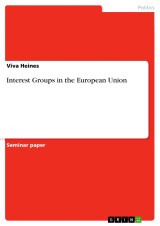Details

Interest Groups in the European Union
1. Auflage
|
13,99 € |
|
| Verlag: | Grin Verlag |
| Format: | |
| Veröffentl.: | 20.11.2019 |
| ISBN/EAN: | 9783346067685 |
| Sprache: | englisch |
| Anzahl Seiten: | 14 |
Dieses eBook erhalten Sie ohne Kopierschutz.
Beschreibungen
Seminar paper from the year 2019 in the subject Politics - General and Theories of International Politics, grade: 2,0, University of Constance (Universität), language: English, abstract: This paper asks, whether interest groups participation enhance the democratic quality of supranational policy making or deteriorate it. Firstly, it will be pointed out how the European policy process is structured, and which institutional organs are involved. Therefore, it will be stated where and how interest groups can effectively influence these institutions and how the interaction between lobbyists and EU-officials is regulated. In a next step, it will be explained what kind of interest groups particularly interact on the EU-level and why they spend so much money on their lobbyism work. Thereby, the advantages and disadvantages of lobbyism in the European Union will be weighted. Finally, improvements for more equality and transparency in the lobbyism context will be presented.
Limits for air pollution in our cities, the approval of chemicals in everyday objects such as baby bottles or the protection of data on the internet: The laws of the European Union have a large and direct impact on all citizens in the member states of the European Union. Consequently, there are a lot of stakeholders who try to influence the European legislation. Recently 948 industry associations, 645 companies and company groups, 444 lobbyist agencies and estates, 244 labor unions and 454 non-governmental organizations are in Brussels to influence the European policy making process. There are approximately 3 lobbyists per parliamentarian in the capital of the European Union. Therefore, Brussels behind Washington D.C. has the second highest lobbyists density in the world. These high numbers explain why a lot of people call lobbyists the "fifth power".
However, the European legislative process is regularly judged to have a lack of transparency and to be very complex because of the many different decision-making-levels and partners involved. That’s why the word "lobbyist" often has a bad connotation and is connected with one-minded representation of industrial interests, with legislation made in back rooms or even with corruption. But contrary, lobbying contributes to the variety of opinions and within fulfills the pluralism of opinions and views in the political dialogue.
Limits for air pollution in our cities, the approval of chemicals in everyday objects such as baby bottles or the protection of data on the internet: The laws of the European Union have a large and direct impact on all citizens in the member states of the European Union. Consequently, there are a lot of stakeholders who try to influence the European legislation. Recently 948 industry associations, 645 companies and company groups, 444 lobbyist agencies and estates, 244 labor unions and 454 non-governmental organizations are in Brussels to influence the European policy making process. There are approximately 3 lobbyists per parliamentarian in the capital of the European Union. Therefore, Brussels behind Washington D.C. has the second highest lobbyists density in the world. These high numbers explain why a lot of people call lobbyists the "fifth power".
However, the European legislative process is regularly judged to have a lack of transparency and to be very complex because of the many different decision-making-levels and partners involved. That’s why the word "lobbyist" often has a bad connotation and is connected with one-minded representation of industrial interests, with legislation made in back rooms or even with corruption. But contrary, lobbying contributes to the variety of opinions and within fulfills the pluralism of opinions and views in the political dialogue.
Diese Produkte könnten Sie auch interessieren:

How Insights from Moral Psychology and Character Research can aid Development Cooperation

von: Jan Prothmann

13,99 €















